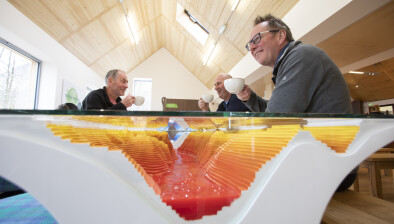Scottish Budget extends affordable housing commitment but private sector ‘overlooked’
Yesterday’s “budget of choices” missed a prime opportunity to encourage a consumer shift towards low carbon homes and fails Scotland’s would-be First Time Buyers, according to Homes for Scotland (HFS).

Ending Scotland’s contribution to climate change, tackling inequalities and investing in the economy and public services were at the forefront of the 2022-2023 Scottish Budget.
Housing and energy efficiency
Finance secretary Kate Forbes outlined £831 million for affordable housing, which she said will progress the Scottish Government’s commitment to delivering 110,000 affordable, energy efficient homes by 2032. The draft budget also included £194.3m for fuel poverty and energy efficiency projects – a 3.4% increase on last year.
However, HFS chief executive Nicola Barclay said: “With COP26 still fresh in our minds, it’s essential that environmental factors become a key determinant for people when choosing a home so it is extremely disappointing that a prime opportunity to encourage such a shift by linking rates of Land & Buildings Transaction Tax and council tax to levels of domestic energy-efficiency has been missed.
“Also frustrating for the 82% of households in Scotland that would like to own their own home, the Scottish Government abruptly closed its hugely successful Help to Buy main scheme and First Home Fund earlier this year due to a reduction in Financial Transactions received from Westminster. Now this has been increased by £134m but nothing has been allocated to restore these initiatives, leaving the Open Market Shared Equity scheme, the criteria for which excludes many would-be purchasers, as the only means of government assistance. Rather than tackling inequality, I fear this will see the gap between the ‘housing haves’ and the ‘housing have nots’ continuing to grow.
“Whilst the continuing commitment for affordable housing is to be welcomed, it once again appears that the fundamental role that the private sector has to play in terms of both delivery and wider economic recovery has been overlooked.”
While “pleased” to see the increase against the projected affordable housing budget for this year, Callum Chomczuk, national director of CIH Scotland, said the figure “is still not enough to meet the ambitious target to build 110,000 affordable, energy efficient homes over the next decade and deliver on both our net-zero ambitions and keep homes affordable”.
Callum Chomczuk added: “We also welcome the support being offered to those least able to pay for home energy improvements, however, this again is likely to be insufficient to allow everyone the opportunity to live in a home that is truly energy efficient while also tackling fuel poverty.”
The Existing Homes Alliance (EHA) also welcomed the increase but warned that next year’s Spending Review must show scaled up, multi-year commitments to eradicate fuel poverty and slash climate change emissions.
Professor Lori McElroy, EHA chair, said: “We recognise that this is a really difficult budget year but investing in energy efficiency and heat decarbonisation is a great way to help address all three of these priorities.
“Whilst this budget is a small step in the right direction, it does not provide the scale of resources needed to deliver the Heat in Buildings Strategy aim of transforming a million homes by 2030. With every budget year that passes, it becomes more and more challenging to meet Scotland’s fuel poverty and climate change targets.”
Professor McElroy added: “Next year’s Spending Review is an opportunity for the Scottish Government to put its money where its mouth is. The First Minister was right when she said in her speech at COP26 that ‘to be credible, their pledges must be backed by action’.
“We have the ambitious targets, we have a robust Heat in Buildings Strategy, now is the time to match that ambition with the financial commitment needed to encourage homeowners to invest, whilst ensuring no additional costs for those in or at risk of fuel poverty.
The recent Climate Change Commission progress report for Scotland identified that, whilst ambition was clear, there’s a lack of detail in some areas. Unfortunately, this budget will not alleviate these concerns, but we have an opportunity through the Spending Review to provide the assurance that the actions and resources committed match the urgency of the climate emergency.”
Tax and other measures
Land & Buildings Transactions Tax (LBTT) rates and bands will remain unchanged for both residential and non-domestic properties, and the government will shortly launch a call for evidence and views on the operation of the Additional Dwelling Supplement which remains unchanged at 4%.
Other notable green announcements included the expansion of the Business Growth Accelerator relief for property improvements to include the installation of solar panels as a qualifying improvement. That will provide 100% relief on new builds for up to 12 months after first occupation and no rate increases for 12 months after a qualifying property improvement.
On income tax, the Starter and Basic Rate bands will increase with inflation, while the Higher and Top Rate thresholds will remain frozen in cash terms. This is estimated to raise an additional £106m in 2022-23.
Other measures announced in the Budget include:
- record funding of £18bn for Health and Social Care, including £12.9bn for health boards, to ensure the necessary support through the pandemic and accelerate the recovery of vital services
- over £1.6bn for social care and integration to progress a commitment to increase spend in social care by 25% by the end of this Parliament, and laying the groundwork for the establishment of a National Care Service
- £150m for walking, wheeling and cycling – progressing our ambitions to create an active travel nation, reduce car kilometres and progress towards net zero
- the biggest increase in funding to support teacher recruitment since 2007, with £145.5m for the sustained employment of additional teachers and classroom assistants
- £123m to protect and restore nature, woodland creation and the sustainable management of Scotland’s woodlands
- almost £1.4bn for the police, maintaining a commitment to protect the police resource budget in real terms for the entirety of this Parliament
- the first funding allocation of £20m for the 10 year £500m Just Transition Fund for the North East and Moray
- an overall funding package of almost £12.5bn for local authorities, representing a like with like real terms increase of 4.5% and a fair settlement for councils
- over £124m for employability and training, including through the Young Person’s Guarantee, National Transition Training Fund and Fair Start Scotland.
Finance secretary Kate Forbes said: “The 2022-2023 Budget addresses our key priorities, targets resources for low income households and paves the way for future investment over the life of this Parliament. It is a budget of choices.
“My last two Budgets have been shaped by our experiences of Covid but we are now lifting our eyes to the future. This is a transitional Budget, as people, businesses and services get back on their feet.
“This Budget focuses on tackling the climate emergency, reducing inequalities and supporting economic recovery. It is the first budget of this partnership in government and has been development in cooperation with the Scottish Green Party, delivering on commitments made as part of the Bute House Agreement. I welcome their support and their constructive challenge.”
Scottish Government minister and Scottish Green Party co-leader Patrick Harvie said: “This Budget delivers on key commitments made in the cooperation agreement between the Scottish Government and the Scottish Greens, including making bus travel free to children and young people and doubling the Scottish Child Payment. Our plans will also see over £2bn invested in tackling the climate emergency, helping accelerate a just transition to a net-zero economy and laying the foundations for a green economic recovery.”
Responses
Mark Stewart, partner and head of energy, infrastructure and renewables at Johnston Carmichael has welcomed the low-carbon spending commitments announced as part of the Scottish Budget but called for greater collaboration between the public and private sectors to achieve effective change.
He said: “It is great that we have the ambition to become a low-carbon country following COP26 and this Scottish Budget, but the reality is that we need to now turn the very positive commitments made into an investible pipeline of projects. Rhetoric needs to become reality.
“I’d like to see the public sector working with entrepreneurs and investors to develop and implement the projects required to achieve net zero. Smart cities with more sustainable infrastructure, including housing, heating and transport, will play a key role and ensure that we secure a just and fair transition that supports the supply chain, skills and jobs.”
Brian Rogan, head of business rates in Scotland for CBRE, said: “We wrote to the Cabinet Secretary this week to reiterate calls from other business organisations that further rates relief support was needed for retail, leisure and hospitality sectors to help with the ongoing challenges of the pandemic.
“The cabinet secretary did make it abundantly clear that today was a budget of choices and we are glad one of those choices was to continue to offer support to the retail, hospitality and leisure sectors with the extension of rate relief however there will be worries from many businesses in those sectors with multiple properties that the cap per business will be insufficient to keep all their premises viable.”
Scottish Property Federation chair Kevin Robertson said: “Today’s budget offers temporary relief for some of the businesses hardest hit by the pandemic in the retail, hospitality and leisure sectors. However, it does not go far enough to support businesses in other sectors that are entering a further year of business rates liabilities based on pre-pandemic levels of activity.
“Our high streets and city centre economies continue to bear the brunt of the economic shock, and the new variant of COVID-19 will create further uncertainty as we head into 2022. The Scottish Government has missed an opportunity to make business rates in these locations more sustainable by resetting the tax base and incentivising much needed investment.”
On measures to support green investment, Kevin Robertson added: “The addition of solar panel installation as an eligible property improvement to attract Business Growth Accelerator relief is welcomed by the SPF. Accounting for around 40% of emissions, our built environment has an important part to play in addressing climate challenge and further policies designed to encourage investment to improve our existing stock will be essential.”
Scottish Land & Estates chief executive, Sarah-Jane Laing, said: “There are many positive announcements in today’s budget. £831m for affordable housing and significant investment towards energy efficiency, natural environment restoration and decarbonisation projects will help ensure Scotland is on the right track to becoming a net zero nation.
“We hope rural Scotland will receive its fair share of this spending and it is welcome to see £51m being invested in rural and island services. The recent storms highlight how important it is that our rural communities are fully supported during such difficult times.
“With the pandemic ongoing and the emergence of the omicron variant, it is also pleasing to see many rural businesses will benefit from a continuation of 50% rates relief into at least the first quarter of 2022.”
ICE Scotland’s director Hannah Smith said: “The Scottish Government’s budget sets welcome commitments across net-zero, transport and housing. However, Scotland’s infrastructure depends not on short-term funding but long-term visions followed by positive action.
“The 2020s must become the decade of delivery not just to meet our 2045 net-zero target but also to ensure our infrastructure is fit for purpose now, and in the future, so it can continue to improve our places, productivity, health and wellbeing.”
Morag Watson, director of policy at Scottish Renewables, added: “Today’s Scottish Budget acknowledges the need to tackle the climate emergency and take key steps to deliver Scotland’s clean energy revolution, with significant pledges made for heat, transport and the energy transition.
“With just 6.4% of Scotland’s heat demand met by renewable sources achieving progress on heat decarbonisation will require us to deploy every tool in the box. The announcement of £414m for energy efficiency, and low-carbon and renewable heat is a welcome step forward for achieving warm homes which are compatible with our net-zero future.
“Scottish Renewables has called for The Scottish Government to increase the size and scale of its existing interest-free loan programmes for heat pumps and to commit to multi-year funding. We welcome the announcement from the Cabinet Secretary for Finance and the Economy in today’s budget that The Scottish Government will double and refocus grants for energy efficiency and heat measures, including heat pumps.
“Scotland’s transition to low-carbon energy offers enormous opportunity to create the green jobs of the future and deliver a just transition for those impacted by the shift away from fossil fuels. Ensuring that Scotland has a skills base which is compatible with net-zero will be critical to achieving this. Scottish Renewables has consistently campaigned for green skills programmes and we welcome the announcement of £23.5m for the Green Jobs Fund.”
















